EQUINE WELFARE NETWORK PROFILE
Donkey Dreams Sanctuary

Donkey Dreams Sanctuary
4343 Amber Ln
LITTLEFIELD, AZ 86432
Founded: 2016
Profile Last Updated June 18, 2025
4343 Amber Ln
LITTLEFIELD, AZ 86432
Mailing Address:
PO Box 951
LITTLEFIELD, AZ 86432
Phone: 928-235-5978
MAKE AN INQUIRY
View our WEBSITE
EIN: 81-3650509Founded: 2016
Profile Last Updated June 18, 2025
Public Charity

2025
The Guardian Seal of Transparency is awarded annually to recognize an organization's commitment to transparency and accountability by their willingness to make comprehensive data about their programs, horse care practices, and governance available for public scrutiny. The Guardian Seal of Transparency is NOT an endorsement.
Awarded Annually
Last Updated: June 19, 2025
Last Updated: June 19, 2025
Donkey Dreams Sanctuary has not attained the Guardian designation for 2026.
MISSION & PROGRAMS
Mission:Provide rescue donkeys (of all ages, sizes and types) a forever home so they feel seen, cherished and loved for the rest of their lives (which can be up to 50 years).
Our organization provides programs involved with equine rescue & retirement
Our organization does not provide outreach and/or public education programs involving horses.
100% of our total programs and services are equine-related.
Our organization is directly responsible for the care and shelter of equines involved in our programs.
Our organization does not CURRENTLY use satellite, overflow, foster, and/or outreach facilities.
Please describe what steps your organization takes to ensure that:
1) all interactions between your equines and people are mutually beneficial and conducted in accordance with the Guidelines for Human-Equine Interactions stated below;
2) all equines in the care of our organization and/or equines that participate in the organization's program have access to clean drinking water at all times; nutritious food in sufficient quantity, including natural forage such as pasture grass and/or hay; appropriate veterinary, farrier, and dental care; shelter and protection from the weather; sufficient safe space to move around comfortably on a daily basis; and daily opportunity to freely interact and have contact with other equines:
Statement on Humane-Equine Interactions
1) Caretaker Guidelines and Responsibilities
Sanctuary Etiquette As a sanctuary, all humans on the property are expected to remember that they are visiting the donkeys in their home. Visitors must respect the donkeys’ personal space and are encouraged to allow the donkeys to approach them.
Our Handbook for Visiting Humans outlines expectations, guidelines, and safety procedures for volunteers, including a Code of Conduct based on the following principles:
Respect for Animals: Treat all donkeys with kindness, compassion, and respect.
Professionalism: Maintain a professional demeanor at all times.
Teamwork: Collaborate with staff and other volunteers.
Safety: Prioritize safety for both humans and animals.
Confidentiality: Maintain the confidentiality of sensitive information.
I. Caretaker Roles and Responsibilities
Donkey Care
Assist with feeding and watering
Clean enclosures and fields
Groom donkeys
Monitor health and behavior
Provide light medical care
Spend time with and cuddle all donkeys on the sanctuary
Facility Maintenance
Help with general ranch maintenance tasks
Communication
Help with guest visits
Assist with social media and website content
Fundraising and Events
Help at fundraising events and activities
Assist with promotional materials and outreach
II. Caretaker Training
The CEO/Executive Director hosts a one-hour orientation for new Friends and Family, showing them where to find tools, how to use them, and what to do upon arrival, during shifts, and before departure. Friends and Family must check in with the onsite supervisor (Donkey Care Manager or CEO/Executive Director) to receive assignments and direction.
The onsite supervisor will guide them through tasks, monitor progress, and remain available for assistance.
Training includes:
Orientation: All new caretakers attend a session to learn about the sanctuary’s mission, policies, and procedures.
On-the-Job Training: Experienced staff provide instruction on tasks such as animal care, maintenance, and guest interaction.
Safety Training: Caretakers receive guidance on safety protocols, including fire safety, first aid, and animal handling.
Caretakers will not be left unsupervised with the donkeys until supervisors are confident in their kindness, care skills, and demeanor.
III. Caretaker Schedule
Scheduling: Caretakers will be assigned shifts based on their availability and the sanctuary’s needs.
Flexibility: Caretakers are expected to be flexible and willing to cover shifts when needed.
IV. Safety Guidelines
Animal Safety
Approach donkeys calmly and avoid sudden movements.
Never feed treats without staff permission.
Stay aware of your surroundings and potential hazards.
Personal Safety
Wear appropriate clothing and footwear. Closed-toe/back shoes are required. SPF shirts are recommended during summer.
Use caution with tools and equipment.
Report any injuries or accidents to staff immediately.
V. Additional Guidelines
Communication: Communicate openly and respectfully with staff and fellow Friends and Family.
Positive Attitude: Maintain a kind and enthusiastic spirit.
Feedback: Share suggestions with staff to help improve sanctuary operations.
VI. Probationary Period
Helping at Donkey Dreams Sanctuary (“DDS”) is a privilege. All Friends and Family undergo a one-month probationary period, during which the DDS team evaluates whether the individual aligns with our animal and personal safety values. DDS reserves the right to terminate the relationship with any Friend and Family member if there are concerns about donkey or human safety.
Open Door Policy
Donkey Dreams Sanctuary has an Open Door Policy that encourages Friends and Family to participate in decisions that affect their roles and responsibilities. Volunteers with concerns or questions are encouraged to speak with their supervisor or any member of the management team with whom they feel comfortable.
Concerns should be raised as soon as possible following the issue. Friends and Family are encouraged to continue open discussion until the concern is resolved. While DDS cannot guarantee satisfaction in every case, it will always attempt to explain outcomes and maintain confidentiality. Some disclosures may be necessary during investigation or as required by law.
No volunteer will be penalized for raising a concern in good faith.
2) Our Sanctuary
Wild Burro and Domestic Donkey Rescue and Care
Donkey Dreams is, first and foremost, a wild burro sanctuary. Our primary focus is rescuing wild burro families who have been rounded up or captured on public lands. We work to keep these families and bonded groups together, honoring their natural social structures and providing them with lifelong care in a safe, natural environment.
In addition to family groups, we also provide forever homes for senior and special needs wild burros—especially those who are at higher risk of entering the slaughter pipeline due to age, health conditions, or inability to adapt to domestic life.
Although less frequently, we also rescue domestic donkeys who have been neglected or whose caretakers are no longer able to provide humane care. Our focus is on preserving the social well-being of the animals by rescuing families and bonded groups, allowing them to live out the rest of their lives together in a natural environment.
In the wild, burros live, eat, sleep, and play in donkey families. Tragically, both in rescue efforts and slaughter auctions, baby male donkeys—called jacks—are often ripped from their mothers at six months old. Similarly, foals are auctioned off without their moms, who are then sent to slaughter, having just watched their babies taken away.
At Donkey Dreams, we rescue groups of wild burros with their herd-mates or family members. Preserving these social relationships is critical to the donkeys’ well-being. We currently care for 10 donkey families and have successfully reunited separated family members. In addition, we are home to dozens of mom-and-baby pairs.
We have designed the sanctuary to mirror the natural environment of wild burros: wide open areas to roam, enrichment stations, grazing areas with appropriate food and water, and multiple fenced areas so donkeys can live as independent herds.
Sanctuary Residents
Our top priority is maintaining excellent care for our resident donkeys and burros. Welcoming entire herds requires close observation and thoughtful adjustment during their acclimation period. We monitor them carefully and adjust their social groupings as needed to support their physical, emotional, and social health—while, of course, providing plenty of cuddles.
We are committed to:
Continuing to provide food, water, shelter, love, and needed medical care to all residents. Over 20 donkeys receive customized supplements and medical support.
Ongoing research, observation, and information-sharing to benefit both our residents and donkeys elsewhere.
Keeping the property clean and well-maintained for safety and health.
Spending quality time interacting with the donkeys to build trust and emotional wellness.
Training donkeys to be comfortable with hoof trims and veterinary care.
Evaluating our resources to determine when we can welcome additional permanent residents.
Equine Transition Services:
Overview of our programs involved with rescue, rehabilitation, retraining, re-homing and/or retirement:
Located in Scenic, Arizona, Donkey Dreams Sanctuary provides rescue donkeys of all ages, sizes, and needs a forever home so they feel seen, cherished, and loved for the rest of their lives. Our sanctuary also offers human and donkey experiences to facilitate an exchange of love, joy, and peace, and to positively impact our community.
At Donkey Dreams Sanctuary, our rescued donkeys bring with them a wide variety of stories. Some are domestic donkeys kept as pets or working animals whose owners are no longer willing or able to care for them. Others are wild donkeys displaced from their homes during roundups facilitated by the Bureau of Land Management, National Parks, Military Bases, and the US Fish and Wildlife Department. After a roundup, these donkeys are at risk of slaughter if they do not find homes with individual adopters or rescue organizations. Additionally, when the donkeys are removed from their homes, their herds are broken apart. Donkey Dreams aims to provide donkeys rounded up with their herd-mates a home by adopting their entire donkey family; this is something most individual adopters or rescues are not in the position to do. For these incredibly social animals, losing family members can lead to depression and, ultimately death. So, keeping social relationships intact is vital to the well-being of the donkeys removed from their homes.
For our donkeys, we offer a forever home aligned with the lifestyle that donkeys are accustomed to, such as having expansive, open spaces to roam for our burros, who are accustomed to roaming and grazing freely. Donkey Dreams is unique in that we work hard to keep donkey families and bonded donkeys together.
Research/Medical Use of Equines:
Our organization has never made, and would not ever consider making, equines available for research studies or medical training that involves invasive procedures and/or that which may cause pain or suffering to the equine.
Religious Affiliation:
Our organization does not promote religious education, religious purposes, or a specific religious faith or use donations for religious education or religious purposes; require participants to be of a certain faith; require participation in religious, instruction, activities or services; or require participation in prayer, worship, religious instruction or other religious activities as a condition of receiving social or secular services offered.
Auction Donation:
Our organization has never allowed, or would not consider allowing, an equine to be sold, transferred, released, or otherwise placed into possession of any person or organization that would cause or allow the equine to be sold at auction for slaughter.
POLICIES: INTAKE, ASSESSMENT & TRAINING
Prior to a horse being accepted and/or arriving at the facility, the organization has the following policies in place:The owner of a potential equine is interviewed over the phone or in person prior to seeing the equine
The equine is evaluated at its place of residence
If health records are not available or are out-of-date, our veterinarian will administer appropriate vaccinations
A health certificate signed by a veterinarian and dated no more than seven days prior to arrival is provided to our organization either prior to or upon arrival of the equine attesting to the health status of the equine
Not Checked:
The owner completes an application/contract which constitutes the agreement between the owner and our organization when the equine is acquired from the equine's owner other than by seizure or by abandonment
The owner is financially responsible for the shipping of the equine to and from the organization
The owner completes an application/contract which constitutes the agreement between the owner and our organization when the equine is acquired from the equine's owner other than by seizure or by abandonment
The owner is financially responsible for the shipping of the equine to and from the organization
Trial Period: Check all that apply:
Equines are not taken on trial
Upon intake, the organization has the following quarantine policy in place:
The equine is confined to a designated and separate area for isolation and quarantine at the facility for a prescribed period of time
The equine is confined to a designated and separate area for isolation and quarantine off-site for a prescribed period of time
Not Checked:
The equine is not quarantined
The equine is not quarantined
The typical length of quarantine is: 20 to 30 days
Following arrival of the equine at the facility, the following is performed:
Physical examination to include temperature, pulse and respiration by a trained staff member upon arrival
A Henneke Body Conditioning Score or other body conditioning score is assigned by a veterinarian upon arrival
Photographs are taken of each equine upon arrival at the facility and kept with the equine's health records
Physical examination by a farrier
The equine is microchipped if the equine has not been microchipped
Not Checked:
Physical examination to include temperature, pulse and respiration by a veterinarian upon arrival
A Henneke Body Conditioning Score or other body conditioning score is assigned by a trained staff member upon arrival
Physical examination by a dentist
Physical examination to include temperature, pulse and respiration by a veterinarian upon arrival
A Henneke Body Conditioning Score or other body conditioning score is assigned by a trained staff member upon arrival
Physical examination by a dentist
Horses are assessed for following skills and behaviors:
Retrieval from a pasture/paddock
Temperament, disposition and attitude, such as rated from very calm to very high spirited
Tolerance to unusual objects and loud noises
Known vices, i.e., cribbing, biting, kicking, weaving, stall walking, etc
Not Checked:
Leading with a halter and lead rope
Saddling
Bridling
Lunging
Loading onto and unloading off a trailer
Mounting and dismounting
Riding at the walk
Riding at the trot
Riding at the canter
Riding by a beginner and/or unbalanced rider
Jumping
Driving (Pulling a carriage)
Grooming
Bathing
Clipping
Tolerance to multiple handlers at the same time
Leading with a halter and lead rope
Saddling
Bridling
Lunging
Loading onto and unloading off a trailer
Mounting and dismounting
Riding at the walk
Riding at the trot
Riding at the canter
Riding by a beginner and/or unbalanced rider
Jumping
Driving (Pulling a carriage)
Grooming
Bathing
Clipping
Tolerance to multiple handlers at the same time
Our organization has the following policies and procedures in place pertaining to the ongoing assessment of horses in its care:
Physical examination by a veterinarian at least annually
The Henneke Body Condition score or other body conditioning score is updated at least annually by the veterinarian
Vaccinations are administered at least annually
Photographs are taken of each equine annually and kept with the equine's health records
Not Checked:
The Henneke Body Condition score or other body conditioning score is updated at least annually by a trained staff member
Photographs are taken of each equine monthly and kept with the equine's health records
Equines at our facility may be treated by an equine chiropractor
Equines at our facility may be treated by an equine acupuncturist
Equines at our facility may be treated by an equine massage therapist
Equines at our facility may be treated by an equine nutritionist
The Henneke Body Condition score or other body conditioning score is updated at least annually by a trained staff member
Photographs are taken of each equine monthly and kept with the equine's health records
Equines at our facility may be treated by an equine chiropractor
Equines at our facility may be treated by an equine acupuncturist
Equines at our facility may be treated by an equine massage therapist
Equines at our facility may be treated by an equine nutritionist
Our organization has the following policies and procedures in place pertaining to the weight-carrying or workload capabilities of horses/equines that are ridden in our care:
No equines are ridden; not applicable
Not Checked:
Our organization evaluates the weight-carrying and workload limitations for each equine that is ridden at least annually
Our organization maintains a written record of the weight-carrying and workload limitations for each equine that is ridden
Our organization does not evaluate the weight-carrying and workload limitations for each equine that is ridden
Our organization evaluates the weight-carrying and workload limitations for each equine that is ridden at least annually
Our organization maintains a written record of the weight-carrying and workload limitations for each equine that is ridden
Our organization does not evaluate the weight-carrying and workload limitations for each equine that is ridden
The following variables are considered in determining the weight-carrying and workload limitations for each equine that is ridden:
No equines are ridden; not applicable
Not Checked:
Equine age, weight, breed, body condition, fitness, balance, health and soundness
Equine conformation to include the top line, length of back, strength and width of loin, bone density (measured by the circumference of the cannon bone just below the knee)
Size, shape, condition and angle of the hooves
Participant weight, height, body proportions, balance, fitness and riding skills as well as behavioral issues and safety concerns
Weight and proper fit of the saddle and other equipment
Terrain and footing in the working environment
Duration and frequency of working sessions, as the frequency with which an equine is subjected to maximum weight carrying and/or workload
Nature and pace of work, repetitive or varied, radius of turns, degree of incline and regularity of footing when equine is subject to maximum weight-carrying capacity
Temperature and/or weather conditions
Seasonal impact on the equines' workload and weight-carrying capabilities and limitations
Our organization does not evaluate the weight-carrying and workload limitations for each equine that is ridden
Equine age, weight, breed, body condition, fitness, balance, health and soundness
Equine conformation to include the top line, length of back, strength and width of loin, bone density (measured by the circumference of the cannon bone just below the knee)
Size, shape, condition and angle of the hooves
Participant weight, height, body proportions, balance, fitness and riding skills as well as behavioral issues and safety concerns
Weight and proper fit of the saddle and other equipment
Terrain and footing in the working environment
Duration and frequency of working sessions, as the frequency with which an equine is subjected to maximum weight carrying and/or workload
Nature and pace of work, repetitive or varied, radius of turns, degree of incline and regularity of footing when equine is subject to maximum weight-carrying capacity
Temperature and/or weather conditions
Seasonal impact on the equines' workload and weight-carrying capabilities and limitations
Our organization does not evaluate the weight-carrying and workload limitations for each equine that is ridden
Horses provided formal training (groundwork or riding): Not applicable; our horses are all retired
Additional information about our intake, assessment & training policies and practices:
The intake process is based on two factors: (1) quarantine and health evaluation prior to arrival, and (2) quarantine and health evaluation upon arrival.
All donkeys who join Donkey Dreams must be up to date on their vaccinations and deworming. All donkeys must have been in quarantine off-site or on-site. When possible, we have vet health evaluations and full blood panels completed prior to their arrival. If not, then after their arrival. If there is any indication of discomfort and sickness, they are evaluated by a vet.
The veterinarian does conduct physical exams of the donkeys, but it may not be immediately on arrival due to the high demand for veterinarian care and the shortage of veterinarian care in our area.
Additionally, upon arrival, all donkeys are photographed, and health is monitored and documented monthly.
Regarding the annual veterinarian exam, to clarify, also due to the shortage of veterinarians, not every donkey is evaluated annually, but every donkey is checked regularly by our vet.
POLICIES: BREEDING
The organization has the following policies related to breeding and stallions:Our organization does not conduct breeding of equines owned or under the care of our organization.
The main facility where our organization conducts its programs does NOT breed equines.
Not Checked:
One or more of the facilities where our organization conducts its programs, including foster/temporary care facilities, breeds equines
One or more of the facilities where our organization conducts its programs, including foster/temporary care facilities, are permitted to house stallions
One or more of the facilities where our organization conducts its programs, including foster/temporary care facilities, breeds equines
One or more of the facilities where our organization conducts its programs, including foster/temporary care facilities, are permitted to house stallions
POLICIES: EUTHANASIA
The organization has the following policies related to euthanasia:Our organization will never have an equine euthanized for space
Our organization will have an equine euthanized upon the recommendation of the veterinarian if the equine is a threat to itself, other equines, or people
Our organization will have an equine euthanized upon the recommendation of the veterinarian after all reasonable treatment options have been explored
Euthanasia is done on site when possible to decrease trauma from transport
Euthanasia is done at the veterinarian's facility
Disposal of the carcass is handled within 24 hours
Not Checked:
Our organization will never have an equine euthanized under any circumstances
Our organization will never have an equine euthanized under any circumstances
The following are authorized to administer the procedure for your organization in accordance with state laws:
Veterinarian
A certified euthanasia technician
Senior staff with appropriate training
Employee of animal control shelter or humane society with appropriate training
Not Checked:
Veterinary student under the supervision of a licensed veterinarian
Not applicable. Our organization prohibits euthanasia under any circumstances
Veterinary student under the supervision of a licensed veterinarian
Not applicable. Our organization prohibits euthanasia under any circumstances
Additional information about our euthanasia policies and practices:
When it is necessary to euthanize a donkey so it doesn't suffer from current or future inhumane pain, we will euthanize the donkey in the way we do everything here: with love and kindness. We also are sure to let the donkey’s herd mates have time to grieve the loss of their donkey friend and/or family member by allowing the euthanized donkey’s body to remain in the presence of the donkey’s herd mates for at least 45 minutes. Additionally, we will monitor the euthanized donkey’s herd mates closely to make sure they are eating and drinking so as not to fall into hyperlipidemia, a fatal condition caused by a sudden withdrawal of eating and drinking, often initiated by loss or grief in donkeys.
POLICIES: RE-HOMING
Re-homing Agreement not applicable.Our organization has the following re-homing (adoption/purchase) policies and procedures in place:
The organization does not re-home equines under any circumstances; our organization retains custody of our equines and ensures care of the equines for their lifetimes.
Our organization has the following policies and procedures related to horses that need to be retired, are no longer able to contribute to the mission of the organization, and/or are no longer manageable:
The organization does not re-home equines under any circumstances; our organization retains custody of our equines and ensures care of the equines for their lifetimes.
Equines may remain at our organization for their lifetimes
In the case an equine is unmanageable and demonstrates repeated dangerous behaviors, the equine may be euthanized upon the recommendation of the veterinarian
In the case an equine is unsound and/or unhealthy and cannot be treated to relieve suffering, the equine may be euthanized upon the recommendation of the veterinarian
Not Checked:
Equines may be found suitable homes by our organization
Equines may be returned to their owners
Equines may be sent to auction
If a suitable home cannot be located within 12 months, the equine may be euthanized
The organization will accept financial responsibility for equines in the current care of the organization that need to be retired or are no longer able to contribute to the mission of the organization if all alternatives have been explored to find the equine an appropriate placement and space is not available for the equine to remain at the organization.
Equines may be found suitable homes by our organization
Equines may be returned to their owners
Equines may be sent to auction
If a suitable home cannot be located within 12 months, the equine may be euthanized
The organization will accept financial responsibility for equines in the current care of the organization that need to be retired or are no longer able to contribute to the mission of the organization if all alternatives have been explored to find the equine an appropriate placement and space is not available for the equine to remain at the organization.
Additional information about our rehoming policies and practices:
Donkey Dreams Sanctuary was created to provide exactly what our name indicates: a dream sanctuary for donkeys. Our seniors and special needs donkeys have exactly what they need, including customized diets, medical treatment, and appropriate housing to accommodate their needs and age. For our donkeys who were removed from their homes and families in the wild, we provide them and their remaining family members/herd mates large spaces to roam and explore and the security that they will remain together as a herd for the rest of their lives—something very important to donkeys. For our mom and baby pairs rescued from slaughter auction, we provide them the peace of mind that they are no longer in the donkey breeding system, that they will not have their babies taken away from them, and that they can roam and explore as a donkey family. For all of our donkeys, we promise them that no matter the trauma they have experienced prior to coming to Donkey Dreams, they can heal here, and that all of their interactions with humans and other donkeys will be positive. For all of the above reasons, we do not re-home because the donkeys who come to Donkey Dreams deserve a safe and loving environment to live and grow old together.
EQUINE CARE & SHELTER/FACILITY INFORMATION
Our organization does not CURRENTLY use satellite, overflow, foster, and/or outreach facilities.Total facilities at which our organization cares for and shelters horses used in our programs: 1
Donkey Dreams Sanctuary
4343 Amber Ln LITTLEFIELD AZ 86432
Currently operational
Total number of horses/equines currently involved with your programs, under your care, and/or owned by your organization at this facility: 74
Total number of horses at this facility NOT INCLUDING those counted above: 0
Maximum capacity of horses at this facility: 80
Does your organization own, lease or use a part of this facility? Use
Provide the contact information for the individual or organization responsible for investigating abuse in the county where the facility is located, including mailing address, email address, and phone information.
Mark Cobb, Animal Control, Mohave County. 928-753-0753 600 W Beale St, Kingman, AZ 86401 No email address available. You have to submit an inquiry on the website, https://mohavecountyaz.mycusthelp.com/WEBAPP/_rs/(S(mufkq4butrir5nwdt2fdirbg))/RequestSelect.aspx?sSessionID=
Does your organization conduct Equine Assisted Services (EAS) at this facility in accordance with the EQUUS Foundation Guidelines on Qualifications of Organizations Conducting Equine Assisted Services (EAS)? No
ADDITIONAL INFORMATION ABOUT THIS FACILITY:
A number of our equines are adopted/transferred to us from Peaceful Valley Donkey Rescue, based in Texas, but the rescues from their Western Division in Scenic, Arizona.
Since our intent is to provide our donkeys with a lifestyle they are most accustomed to, each donkey is a member of one of our seven herds. This means they all live together in one of our seven areas that is designed to provide them space for roaming, running, and playing. Additionally, we have two community donkey areas that the herds get to access daily so they get the stimulation and physical exercise donkeys so much need as a result of their natural lifestyle. Therefore, we have seven main living spaces, two community donkey areas, and three smaller areas for donkeys to eat their special diets or quarantine upon arrival or if they get sick.
Information about our security is below as requested: “Private Property - Private Donkey Sanctuary - Do Not Approach the Fence” and "Video Surveillance" signs are posted every 50ft - 75ft along the public facing fence lines.
We have cameras in place to monitor the sanctuary including monitoring equines overnight. Video surveillance records are kept and maintained by the facility manager.
Veterinarian Information: Donkey Dreams Sanctuary (*Main) Currently operational
Veterinarian: Dr. Cayla Moore
Clinic Name: Moore Equine Veterinary Services
58 S 3430 E
New Harmony UT 84757
Phone: 435-429-5254
Grounds: Donkey Dreams Sanctuary (*Main) Currently operational
Total acreage dedicated specifically to the horses: 9
Our organization has use of the following at this facility:
Structures/Barns: 0 Run-in sheds: 12
Pastures: 0 Paddocks/Pens/Turnout Areas: 7
Uncovered Outdoor Rings: 0 Covered Outdoor Rings: 0 Indoor Rings: 0
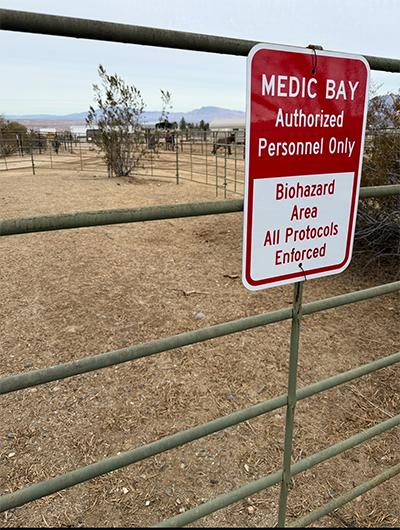
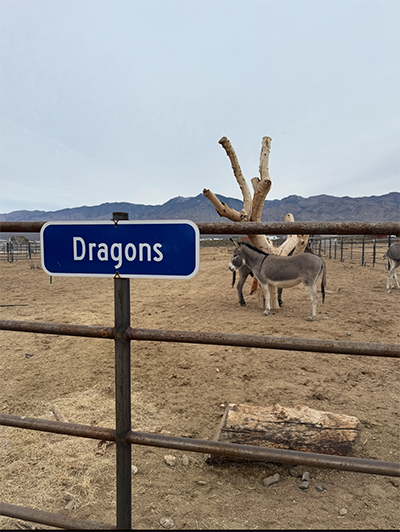
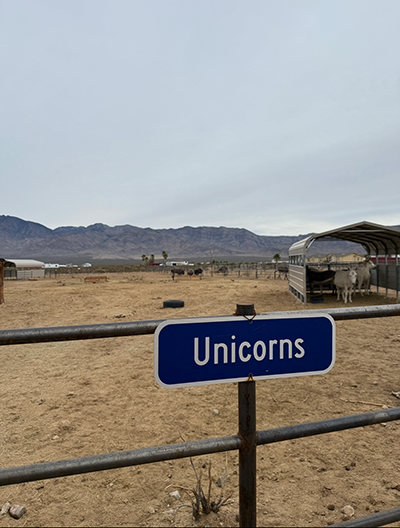
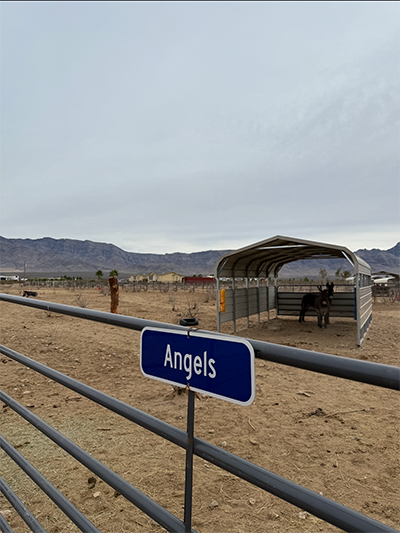
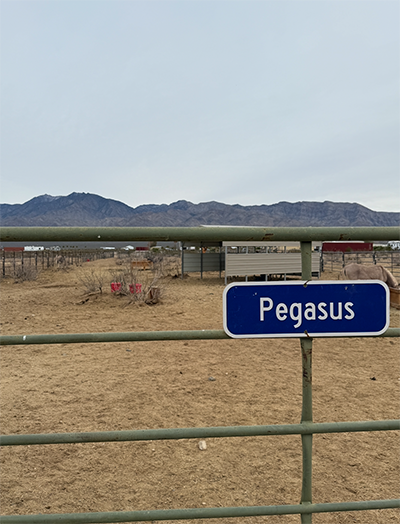
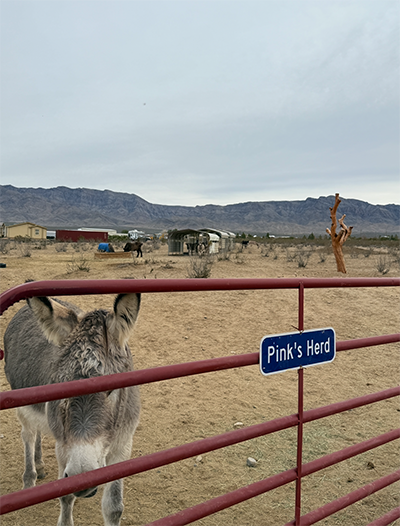
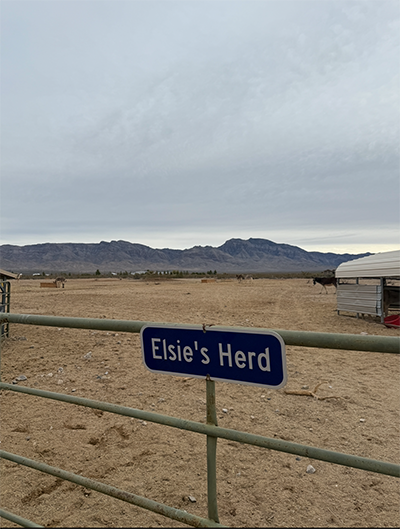
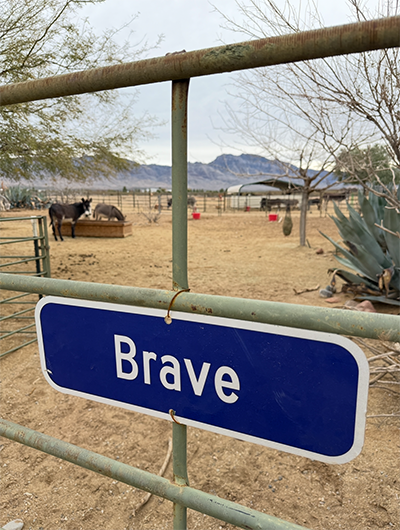



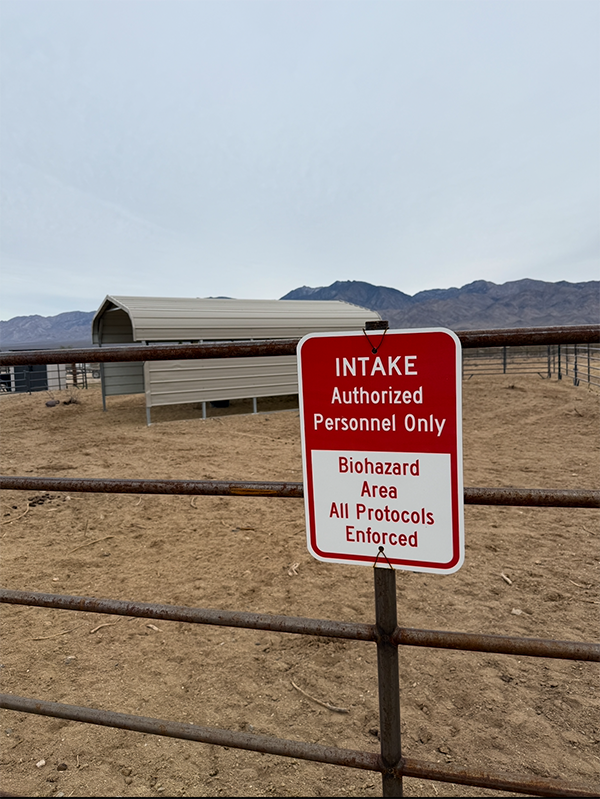
Are the organization's rules, restrictions and warnings (signage) conspicuously posted in easily accessible locations? Yes
Are the organization's emergency contacts, including veterinarian contact information, conspicuously posted in easily accessible locations? Yes
Are human and equine first aid kits easily accessible? Yes
Regarding all shelters where horses are housed including run-in sheds:
Do horses have assigned stalls in the barn/structure(s) or exclusively assigned shelter locations where they are separated from other horses with a barrier? No
How many hours per day, on average, are horses stalled or restricted to these sheltered exclusive shelter locations? 0-3;
How often are the stalls/shelters cleaned, i.e., kept in good repair and free of standing water, accumulated waste, sharp objects and debris? 6-7 Days a Week
Do all stalls/shelters allow horses to lie down, stand up and turn around and provide protection from inclement weather (wind, sleet, rain, snow and extreme temperatures)? Yes
Are stalls/shelters kept in good repair, with adequate ceiling height, and free of standing water, accumulated waste, sharp objects and debris? Yes
Are floors constructed and maintained for both good drainage and traction? Yes
Is there a ventilation and circulation system in place to allow free flow of air to control temperature, and humidity, and to prevent air stagnation? Yes
Is wiring inaccessible to horses and maintained for safety in all areas of facility? Yes
Are fire prevention/protection measures (fire alarms, extinguishers and sprinkler systems) maintained and in good working order? Yes
Is there adequate lighting to ensure safety in all areas of facility? Yes
How many hours per day, on average, are horses turned out:
Equines are out 24/7
The following describes the pastures at this facility:
All pastures are fenced to prevent escape or injury
Fencing checks, such as broken or missing planks, loose fence posts, exposed or loose nails, detached wires, etc., are done regularly
Pastures have natural protection for equines (i.e., trees)
Pastures have man-made protection for equines (i.e., shelters)
Not Checked:
This facility does not have pastures where equines can graze on pasture grass
This facility has a written plan in place for pasture management, which includes guidelines for seeding, fertilizing, irrigation, mowing, dragging, harrowing, manure removal, removal of debris, the control of poisonous plants, and a schedule for cleaning
A dedicated staff person(s) is responsible for pasture management
Barbed wire is used for fencing
Electric fencing is used; electric wires or tape fence are visibly marked
Pastures are rotated
This facility does not have pastures where equines can graze on pasture grass
This facility has a written plan in place for pasture management, which includes guidelines for seeding, fertilizing, irrigation, mowing, dragging, harrowing, manure removal, removal of debris, the control of poisonous plants, and a schedule for cleaning
A dedicated staff person(s) is responsible for pasture management
Barbed wire is used for fencing
Electric fencing is used; electric wires or tape fence are visibly marked
Pastures are rotated
The following describes the turnout areas other than pastures at this facility:
This facility has a written plan in place for the maintenance of turnout areas, which includes a schedule for cleaning, manure removal, and dragging
A dedicated staff person(s) is responsible for the maintenance of turnout areas
All turnout areas are fenced to prevent escape or injury
Turnout areas have man-made protection for equines (i.e., shelters)
Fencing checks, such as broken or missing planks, loose fence posts, exposed or loose nails, detached wires, etc., are done regularly
Not Checked:
This facility does not have turnout areas
Barbed wire is used for fencing
Electric fencing is used; electric wires or tape fence are visibly marked
This facility does not have turnout areas
Barbed wire is used for fencing
Electric fencing is used; electric wires or tape fence are visibly marked
The following policies and procedures are in place at the facility to restrict public access and to keep horses safe:
The property owner, staff member or caretaker lives on the premises and ensures that public access is restricted and is responsible for the security of the facility and equines
There is a mechanism in place to monitor equines overnight
No Trespassing signs are posted
Hold Harmless signs are posted
Authorized Personnel Only signs are posted
Entrance gates are locked at night
Visitors are only permitted at specific times
Visitors are only permitted in specific areas
The property is fitted with a security system that is monitored internally by staff (or the property owner)
The perimeter of the property is fully fenced
Not Checked:
A security guard is present at night
By Appointment Only signs are posted.
The property is fitted with motion lights
The property is fitted with a security system monitored by police or a professional service
A security guard is present at night
By Appointment Only signs are posted.
The property is fitted with motion lights
The property is fitted with a security system monitored by police or a professional service
Equine Care/Emergency Preparedness: Donkey Dreams Sanctuary (*Main) 2026 and 2025 This section is required.
Horse Health Care/Barn Management Records: What system is used to collect and store health/horse care records?
Notebook or equivalent (technology not utilized)
Onsite computer with cloud-based backup storage system
The organization utilizes its own system to maintain records
Our organization would use free cloud-based barn management software if available
The following items are consistent with our feed management plan and practices:
Equines are provided with individualized feeding plans, including supplements, according to the equine's age, breed/type, condition, size, work level and any health issues, consisting of nutritious food provided in sufficient quantity and access to adequate natural forage, or be fed daily, or as recommended by the organization's veterinarian
Feed plans are determined in consultation with a veterinarian
Supplement plans are determined in consultation with a veterinarian
Equines are fed grain in individual stalls
Equines are fed grain in groups
Staff and/or volunteers are trained in proper feed measurements and protocols and observed periodically to ensure they are feeding correctly
The feed chart is centrally located and updated as needed
The area(s) where hay, feed, grain, and supplements are stored are kept clean, free of debris and chemicals, and protected from weather and other animals in rodent-proof and mold-proof containers and grain bins
Feed, supplements and hay types are clearly labeled
Water sources, i.e., buckets, troughs, automatic waterers, etc. are kept clean, free of contaminants, debris and chemicals, protected from weather and other animals, and be positioned or affixed to minimize spillage.
Medications are kept in a secure area
Not Checked:
Is clean, potable water available at all times for all equines? Yes
Hoof Care: How often is hoof care provided for each equine? Every 4-8 weeks and when an issue arises
Dental Care: How often is dental care provided for each equine? Only when an issue arises
Horse checks: How often are equines visually and physically checked by personnel at the facility? Every 2 or 3 days
Our organization has the following parasite and fly/insect control protocols in place, including remedies used to control flies and insects:
Our organization follows the parasite control guidelines of our veterinarian, including fecal testing and de-worming
Fly/Insect Control Remedies:
Fly parasites
Fly Traps and Tapes
Premise Sprays/Insecticides
Fly Spray Repellent
Fly Masks
Fly Sheets
Fans
Not Checked:
The following represent the biosecurity practices in place at facility:
Our organization follows the biosecurity guidelines of our veterinarian
Sick, affected and/or quarantined equines do not have contact with other equines or other animals
The organization has a written biosecurity plan
Staff are trained in best practices related to biosecurity
A specific individual is trained and assigned to care for sick, affected and/or quarantined equines
Sick, affected and/or quarantined equines are cared for last if the caretaker must also care for healthy equines
Restricted access signs are posted at primary points of access to sick, affected and/or quarantined equines
Hand sanitizers are available at all primary points of access to sick, affected and/or quarantined equines
Footbaths are available at all primary points of access to sick, affected and/or quarantined equines
Manure and bedding from sick, affected and/or quarantined equines is removed from the facility - not put in open air piles, and not spread on pastures
Quarantine areas, such as stalls, aisle ways, paddocks, and common areas, are cleaned (and needed, disinfected) after conclusion of the quarantine.
Trailers/vans used by sick, affected and/or quarantined equines are cleaned and disinfected after each use and cleaning takes place away from where equines are sheltered
Equipment used by sick, affected and/or quarantined equines is not shared
Equipment used by sick, affected and/or quarantined equines is cleaned of organic debris and disinfected after each use
Latex gloves, or equivalent gloves, are worn when working with sick, affected and/or quarantined equines
Not Checked:
Volunteers are trained in best practices related to biosecurity
Equines are not quarantined on arrival.
Volunteers are trained in best practices related to biosecurity
Equines are not quarantined on arrival.
Additional information on biosecurity:
Intake, Quarantine and Biosecurity Plan is available on request.
The following represent the manure removal practices in place at facility:
Manure is stored in dumpster(s)
Manure is piled in an area where equines are not located
Manure is hauled, sold or given away
Our organization adheres to the manure management guidelines set by the state, local authorities, and/or our organization's veterinarian
Not Checked:
Manure piles are covered
Manure piles are composted or spread on pastures
Manure piles are covered
Manure piles are composted or spread on pastures
The following steps are taken to help staff and volunteers readily identify each horse on the property:
A notebook or binder with photos and information on each equine is easily accessible
A map/diagram is posted showing the location of each equine with equine names and photos
Equine photos and profiles are available on the website
Staff and volunteers are provided with an information packet with equine profiles, including photos and detailed descriptions
Staff/volunteers are provided training on conformation, markings, colors, and breeds
Not Checked:
Equines are assigned the same exclusive stall/shelter location each day
Name plates are located on the stall/shelter location
Photos are located on the stall/shelter location
Equines wear halters with nametags
Equines are assigned the same exclusive stall/shelter location each day
Equines are assigned the same exclusive stall/shelter location each day
Name plates are located on the stall/shelter location
Photos are located on the stall/shelter location
Equines wear halters with nametags
Equines are assigned the same exclusive stall/shelter location each day
Our organization has the following policies and procedures in place pertaining to tack, apparel and equipment:
No equines are ridden; saddles, bridles, etc. not applicable.
Not Checked:
All equines have specifically assigned apparel, equipment and tack (saddles/bridles if ridden) that is not shared
Saddles are shared
Saddle pads are shared
Bridles are shared
Bits are shared
Blankets are shared
Sheets are shared
Turnout apparel is shared
Blankets, sheets and turn out apparel are fitted and utilized for each equine appropriate to the equine's needs and the weather conditions
Blankets, sheets and turn out apparel are cleaned regularly as needed
Halters are shared
Riding Tack is always cleaned after each use
Riding Tack is always cleaned at least weekly
Riding Tack is cleaned only when needed
Riding Tack is inspected for overall working condition before each use by trained personnel
Riding Tack is assessed for fit before each use by trained personnel
Riding Tack is assessed for fit by trained personnel when an equine's body condition changes
Riding Tack is assessed for fit by trained personnel when an equine's disposition changes
This facility enlists the services of a professional saddle fitter at least once a year
Assigned riding tack is clearly labeled
Riding Tack is stored in a climate-controlled location
Helmets are shared
Helmets are cleaned/disinfected after each use
Helmets are replaced after a fall
Helmets are replaced at least every five years.
All equines have specifically assigned apparel, equipment and tack (saddles/bridles if ridden) that is not shared
Saddles are shared
Saddle pads are shared
Bridles are shared
Bits are shared
Blankets are shared
Sheets are shared
Turnout apparel is shared
Blankets, sheets and turn out apparel are fitted and utilized for each equine appropriate to the equine's needs and the weather conditions
Blankets, sheets and turn out apparel are cleaned regularly as needed
Halters are shared
Riding Tack is always cleaned after each use
Riding Tack is always cleaned at least weekly
Riding Tack is cleaned only when needed
Riding Tack is inspected for overall working condition before each use by trained personnel
Riding Tack is assessed for fit before each use by trained personnel
Riding Tack is assessed for fit by trained personnel when an equine's body condition changes
Riding Tack is assessed for fit by trained personnel when an equine's disposition changes
This facility enlists the services of a professional saddle fitter at least once a year
Assigned riding tack is clearly labeled
Riding Tack is stored in a climate-controlled location
Helmets are shared
Helmets are cleaned/disinfected after each use
Helmets are replaced after a fall
Helmets are replaced at least every five years.
Emergency Preparedness: Donkey Dreams Sanctuary: *Main This section is required.
The following plans, policies, and procedures are in place at the facility to handle emergencies and address weather related issues, fire safety procedures, and/or any additional hazardous scenarios the facility could potentially experience:
The facility owns or has access to a generator
The facility maintains at least two weeks of hay, feed, shavings and medications
The facility maintains appropriate liability and/or workers' compensation insurance
The organization has a written emergency preparedness/safety plan (EPP)
Not Checked:
Emergency procedures are posted prominently
The facility collects and maintains medical information from staff, volunteers, and clients
The written EPP addresses the following areas: Emergency procedures are posted prominently
The facility collects and maintains medical information from staff, volunteers, and clients
Local fire department and/or the state's emergency planning department procedures
Medical emergencies for clients, staff, and volunteers
Medical emergencies for equines
Evacuation plans
Power outages
Fire
Natural Disasters - thunderstorm, hurricanes, earthquakes, tornados, etc
Protocols to notify emergency personnel
Building/facility exit plans
Not Checked:
Terrorist attacks
Terrorist attacks
The facility follows the specific procedures to help PREVENT emergency situations:
Smoking is strictly prohibited
NO SMOKING signs are posted prominently
Hay is stored away from permanent or temporary structures where equines are stalled
Permanent or temporary structures where equines are stalled are kept free of dust, cobwebs, trash, cleaning rags, and other flammable items
Aisles and doorways are kept clear
Not Checked:
Heaters with automatic shutoff settings are used
Heaters with automatic shutoff settings are used
How often are the following checked or performed?
Fire Extinguishers are checked: Semi-annually
Smoke detectors are checked: Semi-annually
Fence lines are checked: Weekly
Turnout Areas are checked: Daily
Sprinkler systems are checked: Not at all/NA
Fire drills are conducted: Semi-annually
Review of safety protocols with staff are conducted: Semi-annually
Review of safety protocols with volunteers are conducted: Semi-annually
The Emergency Preparedness Plan is reviewed and updated: Semi-annually
Equine Transportation: 4= Onsite: 1 (1 + 0) + Offsite: 3
4-horse van/trailer with truck:
1 Access offsite;
8-horse van/trailer with truck:
1 Owned onsite
10-horse van/trailer with truck:
2 Access offsite;